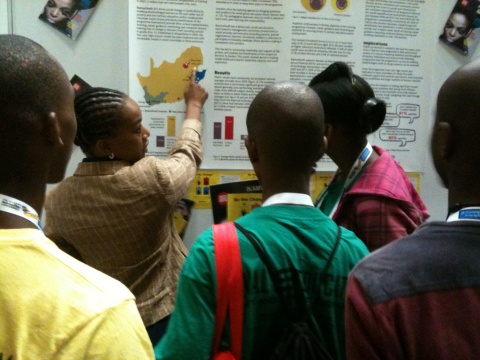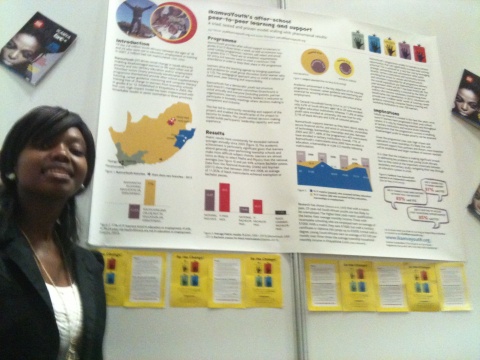The first day of the Basic Education Conference was pretty exhausting. Ikamvanites were there at the crack of dawn to put up our poster in the rather sad corner we’d been allocated. Thankfully, for those who may have missed us (and the many who couldn’t make it to Durban or pay the huge registration fee), it’s available here for download. We’re really grateful to @ideainaforest for making it so beautiful, and are proud to see our great results represented visually.
Andy Hargreaves’ keynote was great. While he wasn’t as funny as he was at Quest (the Canadian conference which put IkamvaYouth on the main stage and not in the corner ;P) his talk was insightful and smart. He spoke about the challenges of a target-driven education model, and the fact that it takes capacity to build capacity. He pointed us to the three things on which we should focus: (i) building human capital and capacity; (ii) building our sociap capital (how well we work together as a community) and (iii) building our decisional capital (our capacity to make judgements).
Most of the presentations detailed, as usual, how badly we’re doing as an education system. Whether speakers were talking about the matric results, the drop-out rates, the lack of parental involvement, literacy and numeracy results for lower grades or the South African system as a whole, the general consensus is that things are really bad. However, while it’s always useful to have a richer understanding of the challenges before us, I’m hoping the conference will move on from detailing what we already know, and focus instead on the solutions we need.
In my search for solutions at the presentations, I was disappointed to hear various academics describing small pilot studies which, while interesting, are not yet anywhere near the stages of replication or scale. More disappointing were speakers who spoke about their successfully scaled projects in very general and vague terms, without explaining their indicators for success, never mind their results.Equal Education’s campaign provided a successful short-term solution to the problem whereby 20% of learning time is lost due to latecoming. We need to look at how to scale and continue this success over the long term.
I began to feel a glimmer of hope listening to Martin Prew describe the dramatic transformation of the Soshanguve district, which achieved phenomenal results at a relatively low cost. However, the depression returned when I realised that the first presentation with a smack of solution was a story that ended over ten years ago. Martin explained the three reasons for the implementation being canned: “politics, politics, politics”. The many ways in which various forms of “politics” are obfuscating efforts came up a lot. It’s no wonder that Equal Education has had enough and is taking the big step to sue the DoE.
I had more luck in my search for solutions at the posters: Axiom is making huge strides in rural education, and TEACH South Africa is contributing to quality education in township and rural schools by providing high-quality, motivated and inspirational young teachers. The Manong Youth Developers outlined their results over a few years, and SAEP’s poster detailed the phenomenal results of its bridging year programme: 88.5% matric pass, 96% improved results with an average of 26.4% per student over all their exams. And 83% access to tertiary or FET. The poster explained that SAEP is currently doing a study and will be sharing the results to help others design similar programmes. The poster presentations also included tools for helping children learn language through guided play (Geordie Muller) and for teaching different forms of writing by linking the process to the methodology of cooking (Ms Jacky Steytler Lamer from Ugie High School).
Perhaps I chose the wrong tracks at the wrong times. Or perhaps day one was focused on setting the scene for the great collaborative effort to “open the doors of quality education for all”. With all the leaders in education under one fancy convention centre roof for two more days, here’s hoping that we’ll make the most of this great opportunity to build our social capital and get moving with smart solutions.



 Lloyd Lungu
Lloyd Lungu